Understanding the Role of Therapy During Addiction Recovery

Recovering from an addiction, whether it is alcohol, drugs, or anything else, is a huge achievement but requires a long journey.
Kicking addiction is more than just stopping use, it is also learning how to live a happy and healthy lifestyle without substance abuse. Counseling is an integral part of the initial recovery, as well as maintaining sobriety long-term.
Patients who suffer from addiction often also deal with additional mental health disorders. When treating addiction it is important to treat the person as a whole, which means using therapy to fix what may have led them to use in the first place and any residual mental health issues.
Therapy is a key component of sobriety, health, and happiness.
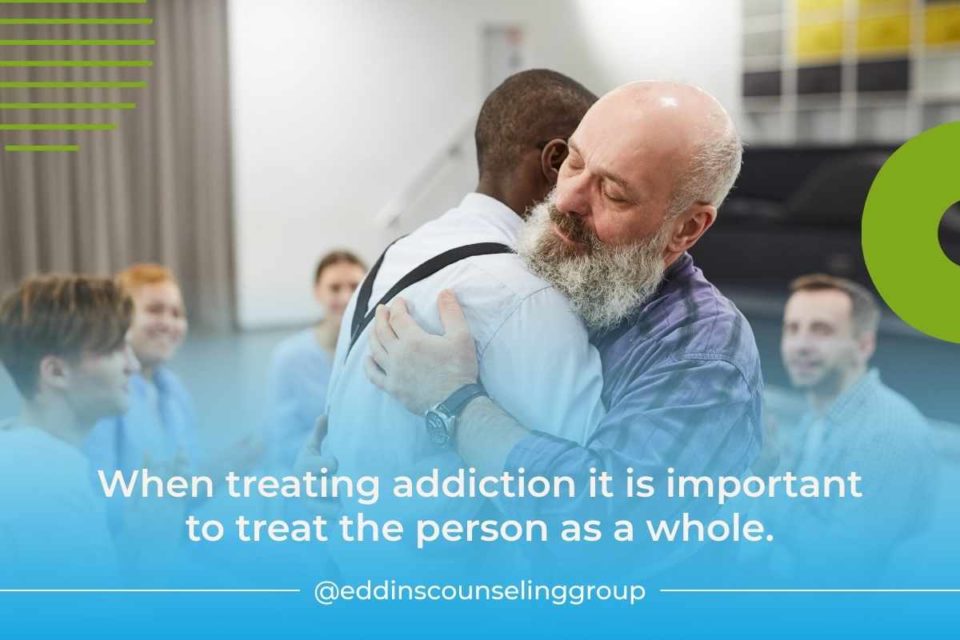
Addiction and Mental Health
There is commonly a correlation between individuals who are diagnosed with a substance abuse disorder and those who are diagnosed with an additional mental disorder.
According to research, around 60 percent of adolescents who are participating in community-based substance abuse treatment programs also meet the criteria to be diagnosed with one or more other mental illnesses.
Substance abuse commonly occurs alongside anxiety and depression disorders, including the following:
● Generalized anxiety disorder
● Panic disorder
● Post-traumatic stress disorder
● Depression
● Bipolar disorder
● Attention-deficit hyperactivity disorder
● Psychotic illness
● Borderline personality disorder
According to research, individuals with schizophrenia have much higher rates of alcohol, drug, and tobacco use than the general population.
The Chicken or the Egg
The connection between substance abuse and mental illness is considered to be somewhat of a “chicken or egg” situation, as experts are somewhat divided as to which causes the other.
Some research suggests that there are genetic predispositions that make a person more likely to develop an addiction.
Experts who prescribe this line of thinking believe that an individual is born with certain traits which are hereditary that increase their risk of becoming addicted when they are exposed to substances.
This “addiction gene” is thought to be passed down across generations. For example, if your father is an alcoholic, you are more likely to also develop substance abuse issues than a friend who does not have alcoholism in their family.
The Role of Mental Illness
While some studies suggest that genetics makes up about half of a person’s risk of becoming dependent on substances, researchers also believe that mental illness plays a huge role.
Individuals who are suffering from mental health disorders will often seek out substances as a form of self-medication.
Many people who are dealing with mental health issues are undiagnosed and therefore may not make the connection between this and their substance abuse.
When it comes to the simultaneous presence of substance abuse and mental illnesses, it is extremely difficult to determine which caused the other.
Even when one developed before another, this does not necessarily mean that it has caused the second one. This is important because some symptoms of mental illnesses are not severe enough, referred to as subclinical symptoms, however, they can still prompt substance use.
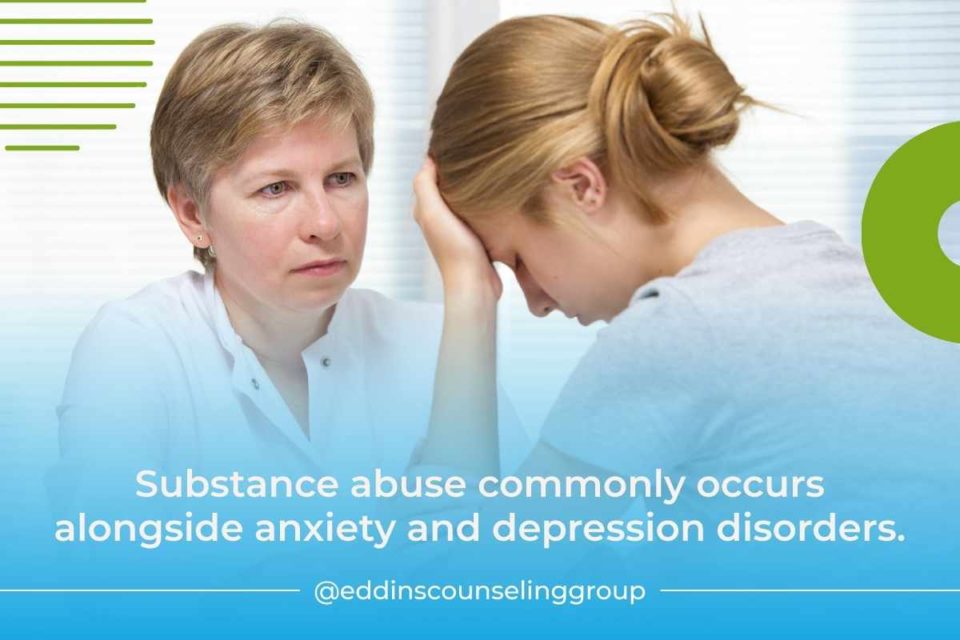
Three Factors
There are generally three factors that contribute to someone having mental illness and substance use disorders, which are:
- Risk factors contributing to both
- Mental illness contributes to substance abuse
- Substance abuse contributes to mental illness
Understanding the correlation between mental disorders and addiction is vital to understanding why therapy is a crucial aspect of substance abuse treatment.
Treating Addiction and Any Underlying Causes
When treating addiction, medical providers have to also treat any underlying causes or side effects of it.
Whether addiction was caused by mental health issues or the other way around, in order to maintain a new, healthier lifestyle, patients will benefit from resolving all symptoms of their mental health.
Counseling provides assistance through 1) detox, 2) long-term solutions, 3) family reconciliation, and 4) a supportive relationship with a therapist.
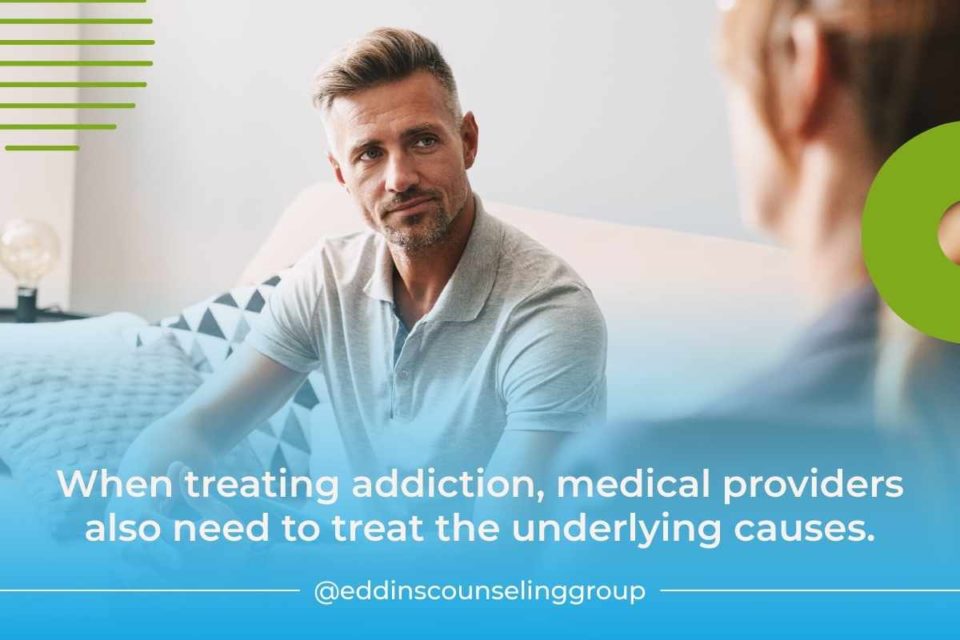
1. Assistance with Detox
When patients have been addicted to a substance for a long period of time, the body has to go through a detoxification process. During this time, the body clears itself of the drugs or alcohol that the individual has been regularly consuming.
Often this detox will result in withdrawal symptoms which can include physical problems like cravings and nausea. However, withdrawal can also have side effects that negatively impact a patient’s mental health, most commonly including the following:
- Nervousness and anxiety
- Insomnia
- Mood swings
- Poor sleep
- Difficulty concentrating
- Body discomfort
Some addiction treatment centers offer medication-assisted treatment (MAT) which relieves some of the physical symptoms of withdrawal. However, behavioral counseling is also a crucial aspect of this form of treatment, and it is helpful for dealing with the mental side effects that come with detoxing.
2. Long-Term Solutions
Quitting an addictive substance is an extremely accomplished task, however full long-term recovery from addiction is a journey that lasts the rest of a patient’s life. Relapse is a serious concern for many recovering addicts, and some studies indicate that around 40 to 60 percent of addicts will experience a relapse at some point in their recovery.
Addiction is a chronic condition that will persist throughout a person’s life, which is why simply getting through detoxification and immediately attempting to integrate into a healthier lifestyle rarely works out.
Counseling is a crucial aspect of successfully achieving long-term recovery from substance abuse.
A therapist will work with the substance abuse patient, to determine what factors may have contributed to their decision to use in the first place.
It is one thing to stop using drugs and alcohol, but if there are mental illnesses involved that are left untreated, a patient is not going to be able to stay clean forever, and will likely relapse.
Therapy provides a solution that treats the person, not just the addiction, and by doing so teaches patients how to move on with their lives. A therapist will also be a place that recovered addicts can turn to for help, as well as gauge their progress.
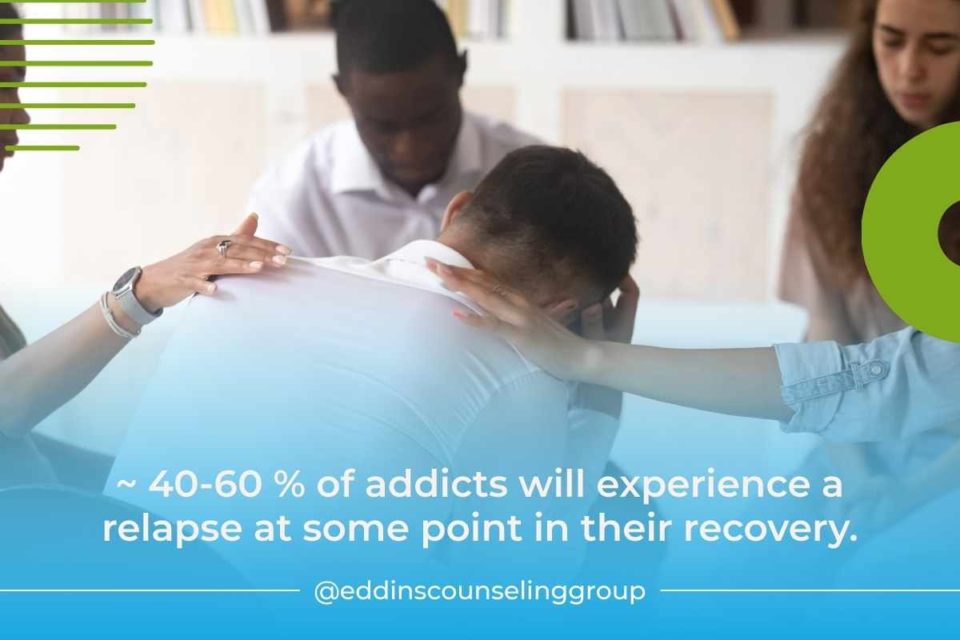
3. Family Reconciliation
Recovering addicts often have strained relationships with family members and friends due to years of addiction and related behavior. A major aspect of recovery is to reconcile relationships with family members who have been hurt or pushed away during a patient’s addiction, as well as help the family members become better equipped to help their loved ones.
Families can also play a role in enabling or contributing to a loved one’s addiction. Seeing someone you love struggle with substance abuse is an emotional experience, however, these emotions can cause people to handle the situation in ways that may be less productive.
Individuals often want to help their family member who is suffering from substance abuse, however, what they think is helping may actually be hurting and enabling them to continue using.
Family members may also unknowingly contribute to their loved one’s addiction, whether it is during childhood, adolescence, or into adulthood.
An individual’s environment can influence their susceptibility to even trying substances in the first place, and a crucial aspect of anyone’s environment is their family.
Counseling offers both the patient and their family an opportunity to work through any dysfunction within their family dynamic to foster a better environment for the patient.
A patient who is recovering from addiction will receive individual counseling, where they have an opportunity to work through any issues they have with their family in private.
A therapist may also bring to light some problems that the patient was not even aware of.
During recovery, patients will often also have the opportunity to receive family counseling, which is an opportunity for both parties to work together with a counselor.
Family counseling is crucial for helping patients and their families reconcile with past problems.
It is also a great learning opportunity for everyone involved and will equip them with the tools they need to move forward in their relationship.
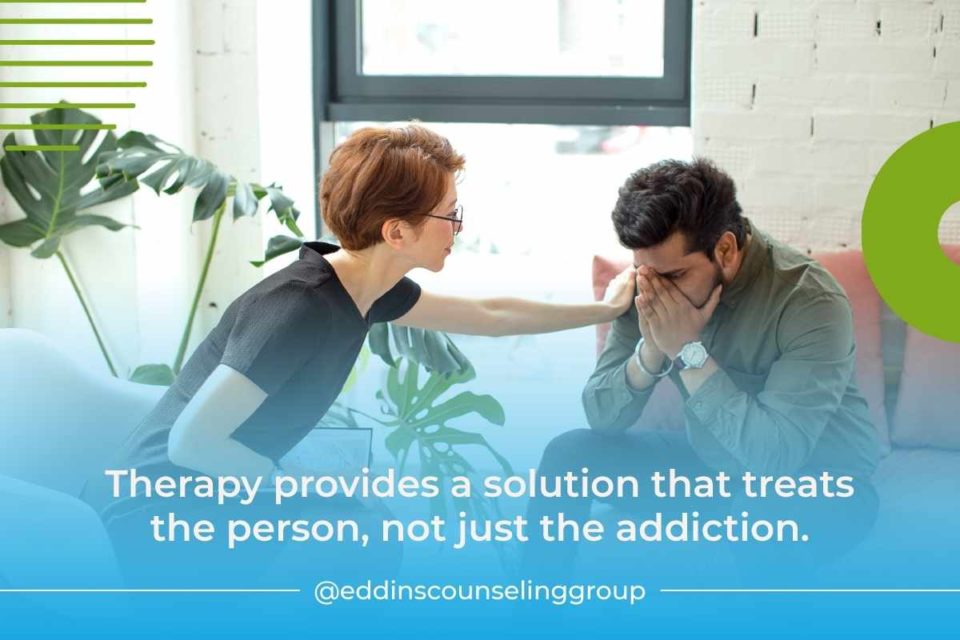
4. The Support of a Therapist
Throughout recovery and in the future, a Montrose therapist is one of a patient’s most valuable resources. Making the decision to seek treatment for addiction is not easy, so having someone that you can trust who is there to help you through your journey is extremely valuable.
A Houston therapist provides an outlet for a patient’s thoughts, questions, and concerns. It can be difficult for people with substance abuse problems to discuss their feelings and addiction with family and friends because of the emotional stake these individuals have in the situation.
Therapists offer a support system for recovering addicts that can aid them through recovery and throughout the rest of their lives.
Due to the chronic nature of addiction, a large majority of patients will benefit from therapy for the rest of their lives.
Finding trust in a Sugar Land therapist will help patients maintain their sobriety and their happiness as they move into a new phase of their lives.
Therapy is important for helping a patient with the building blocks of their recovery during treatment, but it is also necessary throughout the patient’s life.

Common Addiction Therapies
Therapy is not one size fits all, so there are different kinds of therapy that professionals will utilize to help patients. Everyone’s addiction is different, so each person is going to be more successful in their recovery if their treatment plan is unique to them, including the kind of therapy they receive.
A therapist may also decide to change the therapy method throughout a patient’s recovery if they believe a new approach would work better. Some common therapies used during addiction treatment include the following:
Cognitive-Behavioral Therapy
Cognitive behavioral therapy (CBT) is used to treat a variety of conditions including depression, anxiety, and substance abuse disorders. This therapy focuses on how our thoughts affect our behaviors.
CBT highlights the idea that psychological issues are partially based on learned patterns of unhealthy behaviors and thoughts. It also emphasizes that people suffering from substance abuse and other psychological problems can learn to relive their symptoms and find better ways of coping with them.
In CBT a medical professional will help a patient identify the negative thoughts that are resulting in unhealthy behavior. Once these patterns of thinking have been identified, the patient will learn ways to change their thinking patterns using various strategies.
Reality Therapy
Reality therapy centers around the idea that all humans have essential needs that they’re looking to fill each day. Some individuals seek these needs using harmful or unpleasant means, however, including turning to substance use.
Reality therapy helps patients identify which essential needs their drug abuse is trying to fulfill; then, counselors work to help them develop healthier behaviors that meet their needs which can include achievement, power, love, freedom, and more.
Motivational Interviewing
Motivational interviewing is a therapy technique that seeks to enhance a patient’s motivation to change their addictive behaviors. Counselors will conduct a series of interviews to determine what internal motivators drive your addictive behaviors, then work with patients to formulate healthier responses to these motivators so they can create new patterns of behavior.
Solution-Focused Therapy
Solution-focused therapy is used to help patients take a future-centered perspective instead of clinging to past decisions that led to their addiction. This goal-oriented treatment uses strengths and skills to prioritize health and develop a system that will allow patients to avoid using again.
12-Step Program
A 12-step program is an addiction recovery option that is based on twelve principles that help people who are suffering from alcohol and drug abuse problems. This kind of program offers the benefits of therapy but with a group of other addicts and not necessarily with a professional.
There are two main components to a 12-step program: a group setting and sponsorship.
- During this program, the twelve steps are discussed and applied with a group of addicts, led by a volunteer or specialist. The members of these groups emphasize self-admission and discuss their addiction and road to recovery together.
- Individuals who participate in a 12-step program will also seek out a sponsor, who is a more experienced recovering addict who can guide them through their recovery as a mentor.
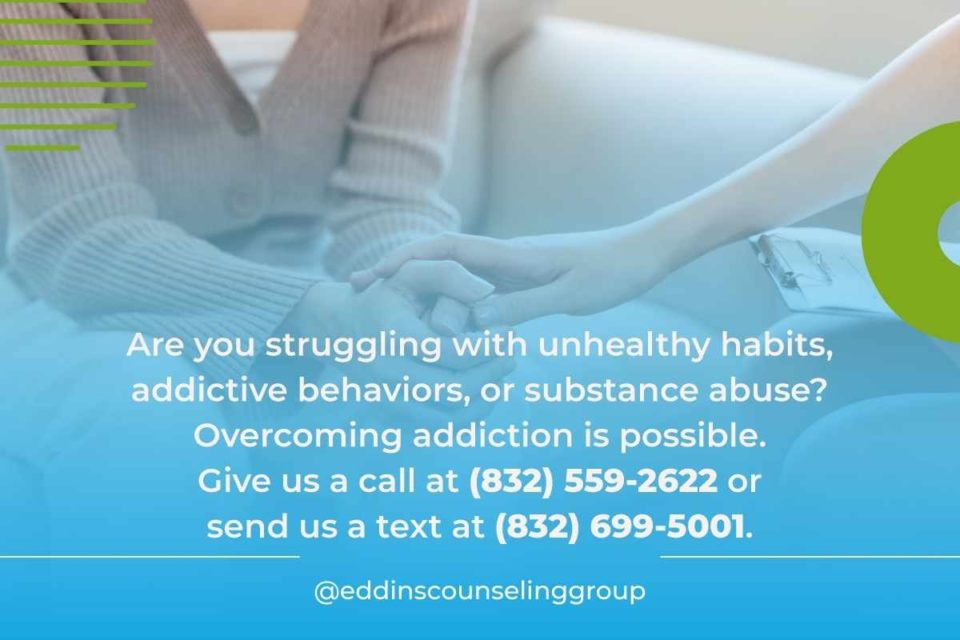
Next Steps
Are you struggling with unhealthy habits, addictive behaviors, or substance abuse? Overcoming addiction is possible.
Give us a call at 832-559-2622 to find out more about Addiction Therapy Treatment in Houston. Or if you’re ready, get started now to schedule an appointment online with our Therapy for Addiction counselors today.
About the Guest Author

Jenn Walker is a freelance writer, blogger, dog-enthusiast, and avid beach goer operating out of Southern New Jersey.













